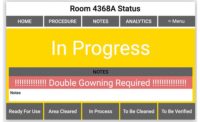HAMILTON, N.J. — A recent quality management market survey conducted by Sparta Systems found that nearly a quarter of organizations (24% of survey respondents) across several highly-regulated industries do not have a well-defined and adopted complaint handling process.
Customer complaint handling plays an integral role in ensuring consumer safety and maintaining regulatory compliance. Proper use of complaint data helps organizations investigate the underlying causes of product issues, and enables them to launch corrective actions or preventive actions that eliminate their re-occurrence.
An overwhelming majority of these organizations, including those from the pharmaceutical and medical device industries, have no plans to invest in improving these processes in the future. 82% of survey respondents said they anticipate their complaint handling budget to either decrease or stay the same in the next 12 months.
As a possible result of these stagnant budgets, many organizations are not taking advantage of technologies that enable more effective complaint management. Nearly half (44% of survey participants) are still using antiquated point solutions, paper-based systems, Excel or Access to support their complaint handling processes. Out of those that are deploying a point solution or centralized platform, only 10% of survey participants have leveraged cloud infrastructure.
"Our report indicates that many organizations within highly-regulated industries are continuing to fight an uphill battle in order to overcome a number of complaint handling challenges," said Joe Humm, vice president of sales operations at Sparta Systems. "In the long run, improving these processes and effectively leveraging customer complaint and quality management data will have a significant impact on a company's bottom line by minimizing the risk of compliance issues and faulty products while quickly escalating key issues to development teams and regulatory bodies."
Additional findings of the survey include:
More than 90% of respondents indicated that between zero and 10% of their complaint records were escalated to regulatory agencies.
Nearly a third (31%) of survey respondents indicated that they have never used complaint handling data to optimize the design of their complaint handling process.
Uses for complaint handling data were nearly split evenly across: improving manufacturing processes (27%), escalating key issues to regulatory bodies (23%), looking for data signals (24%) and informing product innovation or improvement opportunities (23%).
Major challenges to managing complaints across the enterprise include: implementation of knowledge to actionable insights, system design/capture of appropriate data, transposing data from reporter to complaint professional, employee training to enter data and processing of data for signal identification.
The full Quality Management Industry Insights Report also includes findings based on anonymized data from Sparta'sValue Assessment and Strategic Planning (VASP) program, which helps businesses benchmark their own performance against others in the industry using similar quality management solutions. To access a full copy of the report, please visit: The Quality Management Industry Insights Report.
Sparta Systems provides quality management and supplier collaboration solutions that enable and connect the quality business network. By leveraging these solutions, organizations in highly-regulated industries are able to achieve compliance and enhance traceability through proactive management of quality and safety processes. To learn more visit www.spartasystems.com.
Survey Methodology
The 2017 Industry Insights Survey was conducted by issuing fourteen questions related to an organization's handling of complaint records or inquiries. Those individuals who received the survey represented a variety of job functions in companies of varying size, and had at least a manager title or above. Survey results were derived from the responses of 148 respondents, and contain no iterations, assumptions or inferences. Additionally, incomplete responses, non-selections, and extreme outliers were left out of the individual sections, and percentages were rounded to the nearest value.
For more information, visit spartasystems.com.






